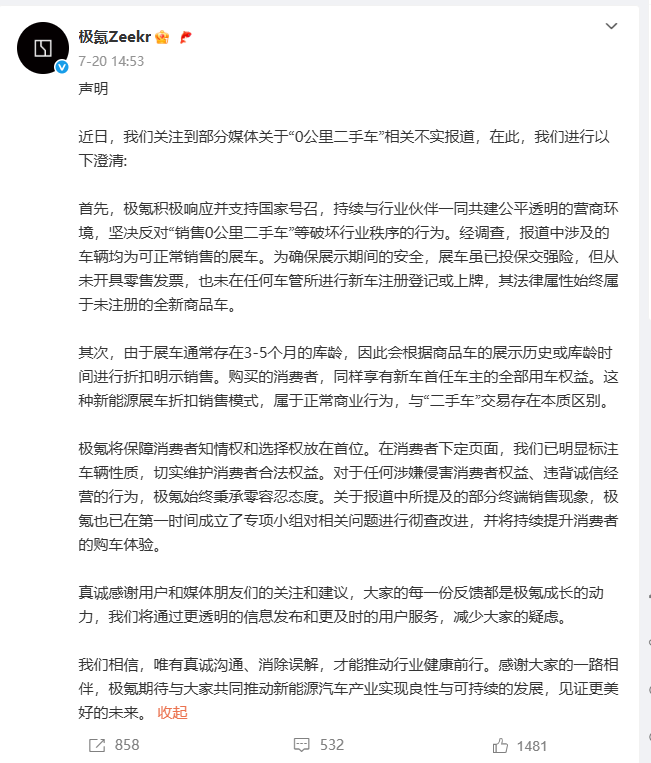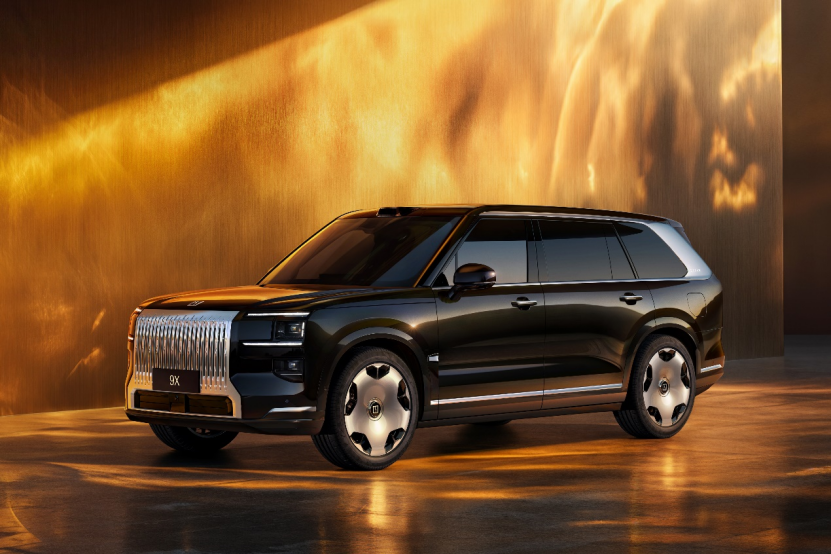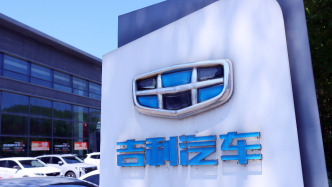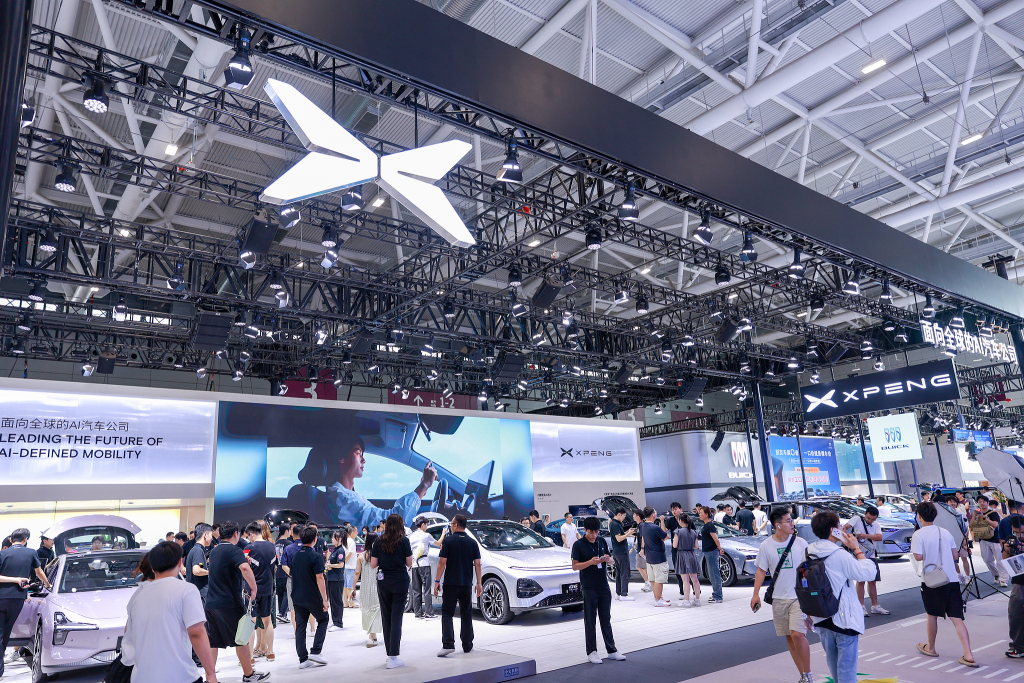
Some of the "unspoken rules" currently adopted by automakers to boost performance are receiving unprecedented attention from all parties.
According to a recent report by Reuters, based on documents it reviewed and interviews with dealers and car buyers, it was found that Chinese electric car brand Nezha had inflated sales in recent years to achieve aggressive targets.
Dealers and car buyers said documents showed Nezha arranged insurance before the vehicles were sold, a practice that allows automakers to confirm sales in advance and meet monthly and quarterly targets, according to China's auto registration industry practice.
The media reported that a copy of the records sent by Nezha Auto to dealers obtained by the media showed that Nezha confirmed the sales of at least 64,719 vehicles in advance through this method between January 2023 and March 2024. This is more than half of the total sales of 117,000 vehicles reported in 15 months.
In China's auto industry, vehicles that have not been delivered to buyers but are registered as sold are called "zero-kilometer used cars." Analysts believe that this practice stems from fierce market competition, and years of price wars are causing the Chinese auto industry to fall into endless strife.
Nezha dealers said that most of the "zero-kilometer used cars" they received are still piled up in the warehouse. They said that the company has only one sentence: "Just do it, everyone else does it."
Nezha ranked eighth among China's new energy vehicle companies with sales of 152,000 vehicles in 2022. Last year, sales fell to 87,948 vehicles (including 23,399 exports), and only 1,215 vehicles were sold in the first quarter of this year. According to public information, the brand has been in financial difficulties since the end of 2024, and its parent company Hozon New Energy entered bankruptcy proceedings last month.
On July 18, China Securities Journal also stated in a report that it interviewed Zeekr buyers in Guangzhou, Chongqing and other places, and these consumers found that the vehicles had been insured before they were sold.
The newspaper questioned Zeekr's unusually high sales in Shenzhen and Xiamen last December, and pointed out that most of the vehicles interviewed were insured by Xiamen Jianfa and its affiliates. According to its understanding, the cooperation model between Xiamen Jianfa Automobile and Zeekr is regional operation + financial cooperation.
Nezha's parent company Hozon New Energy Automobile and Xiamen Jianfa did not respond to requests for comment.
On July 20, Zeekr responded through its official Weibo account, saying that some media reports about "0-kilometer used cars" were false. It clarified that the media reports said the vehicle was a showroom car, confirmed that it had purchased compulsory traffic insurance "to ensure vehicle safety", and emphasized that it was "still a new car in the legal sense" when it was sold. It also stated that it had set up a special team to thoroughly investigate and improve the sales issues mentioned by the media.

However, Li Yanwei (@桑之未V), an analyst at the China Automobile Dealers Association, immediately questioned the statement in Zeekr's statement on Weibo that "although the exhibition car has been insured with compulsory traffic insurance, no retail invoice has ever been issued." He said that according to regulations, in order to purchase compulsory traffic insurance on a new car, it is necessary to provide the insurance company with the new car invoice number and enter the "invoice number" into the insurance company's system so that the system can generate a compulsory traffic insurance policy.

In fact, in the eyes of outsiders, the "zero-kilometer used cars" phenomenon publicly proposed by Wei Jianjun, the founder of Great Wall Motors, in order to boost performance has almost become a universal "unspoken rule" in the automotive industry.
On July 19, Auto Horizon, a magazine under the China Association of Automobile Manufacturers, said in a report titled "Zero-kilometer used cars, are they a consumer benefit or an industry chaos?" The reporter searched multiple second-hand car trading platforms and found that such zero-kilometer used cars cover almost all current mainstream car brands, and the selling price is 15%-20% lower than that of new models.
In June this year, the People's Daily published a commentary that pointed out the gray industry chain of "zero-kilometer second-hand cars" in the automobile circulation field. These vehicles are sold as brand new cars, but in fact they have been registered and transferred to the dealer. When consumers buy them, they are legally "second owners", which makes it impossible for them to enjoy the exclusive rights and interests of the first owners provided by the manufacturer, such as lifetime warranty and free charging services. What's more serious is that some vehicles may have hidden dangers such as inventory backlogs and transportation damage, but they are packaged as "quasi-new cars" and enter the market.
The circulation of a large number of "zero-kilometer used cars" will also erode the profit margins of new car retailers. On June 30, the Shanghai Automobile Sales Industry Association, Jiangsu Federation of Industry and Commerce Automobile Sales Chamber of Commerce, Zhejiang Automobile Circulation Association, and Anhui Automobile Dealers Chamber of Commerce jointly issued a "Letter on Urging OEMs to Improve the Operating Difficulties of Automobile Dealers in the Yangtze River Delta Region."
The Automobile Dealers Chamber of Commerce of the four provinces and cities in the Yangtze River Delta said that in response to the increasingly fierce "involutionary" competition in the current automobile market, the Automobile Dealers Chamber of Commerce of the four provinces and cities conducted market research on the operating conditions of automobile dealers in their respective jurisdictions. The survey showed that automobile dealers in the Yangtze River Delta region generally face severe challenges such as high inventory, disordered market competition, and increased risk of capital chain rupture. Some OEMs have forced dealers to sell new cars at prices below cost in disguised form according to their pricing rules, which has been suspected of violating the "Anti-Unfair Competition Law of the People's Republic of China".
The automobile dealers chambers of commerce in four provinces and cities stated that dealers are currently facing multiple pressures such as inventory pressure breaking through the warning line, intensifying cash flow crisis, a cliff-like decline in sales, and dual pressures of cost and assessment. The industry has prominent problems such as unbalanced target setting, deformed rebate system, collapsed price system, and damaged supporting services.

Therefore, the automobile dealer chambers of commerce in the four provinces and cities strongly urge all OEMs to support dealers in establishing production and sales coordination mechanisms, optimizing rebate pricing policies, strengthening risk-sharing awareness, and jointly building a healthy industry ecology.
The Department of Consumer Promotion of the Ministry of Commerce has convened a symposium with automakers and relevant industry organizations, stating that it will regulate and rectify the chaos of "zero-kilometer used cars" and guide the export of used cars. Relevant ministries and commissions of the State Council have also convened meetings of leading companies in the industry to express concerns about such practices, sending a clear signal of "anti-involution".


